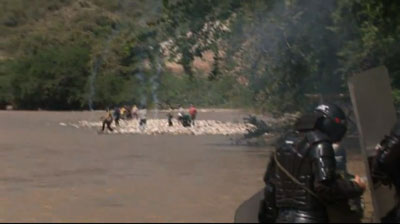New York, February 29, 2012–Colombian freelance journalist and activist Bladimir Sánchez Espitia fled his home state today for the capital city after receiving death threats related to a video he posted on YouTube, according to the Bogotá-based Foundation for Freedom of the Press (FLIP). News reports said the video showed anti-riot police forcibly removing protesters from the construction site of a controversial hydroelectric dam in central Huila department.
“Colombian authorities must investigate these threats and take all measures to protect Bladimir Sánchez Espitia,” said CPJ’s Americas Senior Program Coordinator Carlos Lauría. “It is essential that journalists be able to report and share information on issues of public interest without fear of reprisal.”
Sánchez told CPJ he was filming the protests on February 14 for an independent documentary about the movement against the hydroelectric dam, which is to be built by the Colombian arm of the Spanish energy firm Endesa. The project would flood 21,000 acres of land and uproot about 1,500 people, according to news reports.
The journalist filmed anti-riot police using tear gas, pepper gas, and smoke bombs to remove dozens of fishermen and other residents from the proposed dam site on the Magdalena River near the town of Gigante. The footage shows one fisherman bleeding from a badly injured eye and others jumping into the river to evade advancing police officers, and is interspersed with interviews. The 14-minute video, which Sánchez sent to friends and posted on social media under the title “The Video the Colombian Government Doesn’t Want Us to See,” became a viral sensation. He later posted it to YouTube, where it has been viewed by more than 910,000 people in nine days.
On February 19, after the video had been widely distributed, Sánchez received an anonymous phone call from someone who accused him of being a guerrilla and warned him to watch out, Sánchez told CPJ. Three days later, Sánchez gave an interview on the popular W radio station in which he accused the police of using overwhelming force. After the interview, the journalist received two more threatening calls from unidentified callers, one of whom told him, “We are going to make you disappear,” according to FLIP. Sánchez told CPJ that he believes police officers in Huila are responsible for the phone calls. “I feel very insecure,” he said.
Col. Juan Francisco Pelaéz, chief of police in Huila, told FLIP that he knew nothing about threats against Sánchez. He recommended that Sánchez file a formal complaint and said that if his accusations are substantiated, he would receive police protection.
FLIP representative David González told CPJ that for his security, Sánchez decided to leave Huila indefinitely and traveled today to Bogotá, where he has meetings scheduled with Interior Ministry officials to discuss his security.
CPJ’s annual report Attacks on the Press found that threats against journalists in Colombia rose in 2011, forcing some journalists to relocate.
